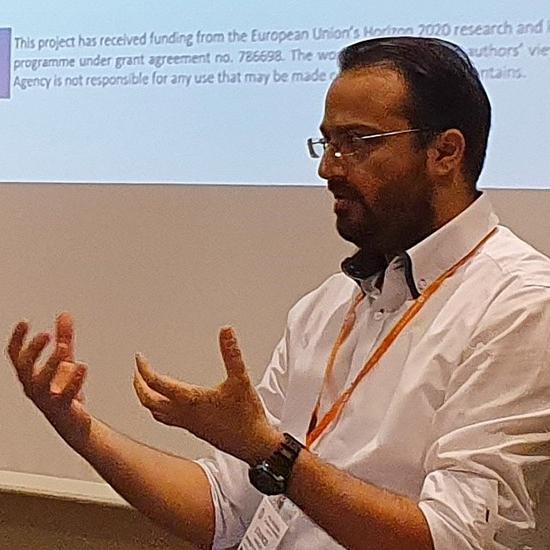About CONF-SPML 2026
The 6th International Conference on Signal Processing and Machine Learning (CONF-SPML 2026) is a leading conference in the fields of signal processing and machine learning. CONF-SPML 2026 serves as an international platform for researchers, academics, industry practitioners, and university students around the world to converge and discuss the latest advancements, methodologies, and applications in signal processing and machine learning. It provides an excellent opportunity for both scholars and students interested in signal processing and machine learning to present their findings and achievements, thus promoting communication and cooperation.
CONF-SPML 2026 aims to bring together researchers and practitioners from academia and industry to highlight the importance of signal processing and machine learning as well as to boost new collaborations in these areas. The conference looks for significant contributions to trending technologies in signal processing and biomedical signal processing in theoretical and practical aspects.
CONF-SPML 2026 is a hybrid conference, establishing an online session and welcoming participants from all countries and regions to join whenever and wherever possible. Meanwhile, to facilitate broader academic exchange and knowledge sharing, CONF-SPML 2026 will host multiple on-site symposium series at Tianjin University. Authors are welcome to submit their manuscripts to the symposium series, each of which will independently handle the submission and review process.
Best Paper
We are honored to announce that, following a rigorous and detailed peer review process, a select group of papers from authors around the globe has been chosen for their exceptional merit to be featured at The 6th International Conference on Signal Processing and Machine Learning (CONF-SPML 2026)
- Enhancing LightGCN with Graph Attention for Personalized Recommendation
By Qingyang Wang - Simpler is Better: Rethinking Model Complexity for Resource-Constrained Visual Question Answering
By Nuoyi Li - Research on a Genetic-Algorithm-Based Coordination and Optimization Strategy for ResourceAllocation in Embedded Multi-Sensor Systems
By Hancheng Shi
We are thrilled to have received and included a multitude of exemplary papers in the conference proceedings.
We eagerly anticipate further outstanding submissions for our future conferences with great excitement.
Review Process
The submission will first be reviewed for its topic and length, then go through an originality check. The peer-review process will begin soon after the paper is found to be qualified. The paper will be sent to have a double-blind peer review by 2 reviewers. They will judge the paper based on the theme, coverage, innovation, integrity, depth, and language. If the paper is accepted, notification of acceptance and review comments will be sent to the author via email. The actual review time may be different in certain situations.
Publication
All papers submitted to the conference will be assigned to the respective symposium committees based on factors such as submission date and topic relevance. Each symposium committee will then coordinate the peer review process, ensuring rigorous evaluation and making final decisions on acceptance and publication.
Conference Proceedings
Accepted papers of CONF-SPML 2026 will be published in conference proceedings according to the research field, which will be submitted to EI Compendex, Conference Proceedings Citation Index (CPCI), Crossref, Portico, Google Scholar, CNKI, Inspec and other databases for indexing. The indexing result will be determined by the conference proceedings in which the paper is included.
* Accepted manuscripts will be submitted to the publisher on a rolling basis. Early-registered papers are expected to be published and printed earlier.
Journals
We call for excellent papers and review them according to the requirements of each journal. Qualified submissions will be directly recommended for publication in the following journals or corresponding Special Issues. The journals listed below have been indexed by Science Citation Index (SCI)/Science Citation Index Expanded (SCI-E) and/or Social Science Citation Index (SSCI):
- JCRQ2 - Sensors [Impact Factor: 3.9; CiteScore: 6.8]
- JCRQ2 - Electronics [Impact Factor: 2.9; CiteScore: 4.7]
- JCRQ2 - Machines [Impact Factor: 2.6; CiteScore: 2.1]
Please refer to the 'Information > Publication' page for specific recommendation rules and guidelines.
Important Dates
| Venue | Final Submission | Date | Notification of Acceptance |
|---|---|---|---|
| Online Session | / | February 4, 2026 | / |
| Symposium Tianjin | December 14, 2025 | December 21, 2025 | 7-20 workdays |
| Symposium Chicago | January 28, 2026 | February 4, 2026 | 7-20 workdays |
Call For Papers
The topics of interest include but are not limited to:
Machine Learning
- Deep and Reinforcement Learning
- Theories and Applications
- Computational Optimization
Previous Speakers

Stavros Shiaeles
Title of Speech: Collaborative Intrusion Detection System Using Blockchain Technology

Sana Ullah Jan
Title of Speech: Sensor Fault Diagnostic Using Machine Learning

Xingqing Xiao
Title of Speech: Deep Learning for Food Monitoring
Partner Journals
CONF-SPML cooperates with the following journals and qualified papers have the opportunity to be recommended for publication in these journals.
Machines (ISSN 2075-1702) [IF 2.6, CiteScore 2.1 (2022)] is an international, peer-reviewed, open access journal on machinery and engineering published monthly online by MDPI. Journal Rank: JCR - Q2 (Engineering, Mechanical) / JCR- Q3 (Engineering, Electrical & Electronic). Manuscripts are peer-reviewed and a first decision provided to authors approximately 15 days after submission; acceptance to publication is undertaken in 2.9 days (median values for papers published in this journal in the first half of 2023).
For more information: https://www.mdpi.com/journal/machines
Sensors is an international, peer-reviewed, open access journal [JCR-Q2, Impact Factor: 3.9; CiteScore: 6.8 (2022)], which publishes reviews, research papers, and communications in various fields, including the science and technology of sensor and its applications. The goal of the journal is to encourage scientists to publish their experimental and theoretical results in as much detail as possible.
For more information: https://www.mdpi.com/journal/sensors

